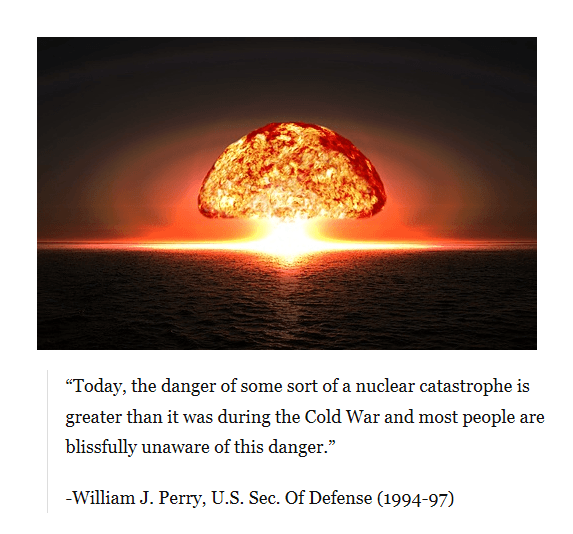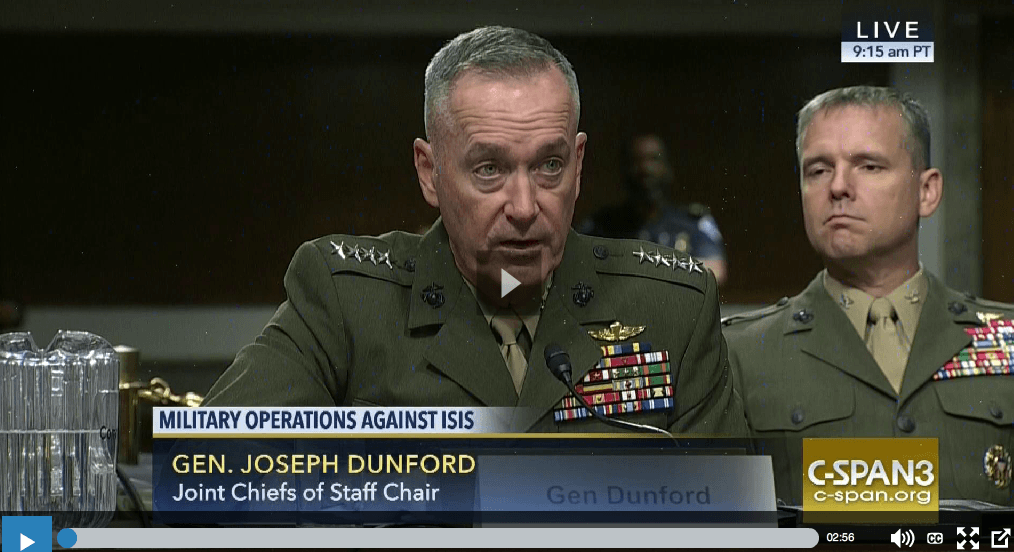At the Brink …
US – Russian cooperation breaks down as Russia again charges the US and US allies with supporting Islamic Salafi-Jihadi forces — and ups the ante after the US September 17th Deir Ezzor “accidental air attack” that killed and wounded 200 Syrian government troops
An Ominous Warning
Russian’s Foreign Ministry spokeswoman Maria Zakharova — “If the US launches (another) direct aggression against Damascus and the Syrian army, it will lead to terrible, tectonic shifts not only on the territory of this country but also in the region in general.”
Update
Putin suspends nuclear pact with Washington, October 3rd
- http://www.reuters.com/article/us-russia-usa-nuclear-idUSKCN1230YN
- http://www.reuters.com/article/us-usa-election-clinton-russia-idUSKCN11Q0EY
- http://www.thetimes.co.uk/article/prepare-for-nuclear-war-russian-state-tells-people-9t9w0jzcs
- https://consortiumnews.com/2016/10/02/obama-warned-to-defuse-tensions-with-russia/
*Ed: The possibility of President Obama resetting US ‘first-use’ and/or ‘hair-trigger’ alert status before he leaves office as we have been advocating for a period of time has now, with this latest escalation, gone by the wayside. The reset is a lost opportunity, a critically vital opportunity, that will not return. The escalations in the Middle East set back nuclear nonproliferation and continue to move the US-Russia and China into a much more dangerous nuclear era.
The Middle East/Eurasia
The complexity of the spillover from the Iraq invasion is evident, if not the origins and frontline shifts of AQI, AQIS … ISI/ISIL/ISIS/Daesh … Al-Nusra-Jabhat Fateh al-Sham, and multiple opponents in the Syrian war, including Turkey and Israel. The tens of millions throughout the region fleeing war’s effects and after-effects, including a change in European demographics and politics could escalate rapidly in the weeks to come.
Competing narratives attempt to explain to the American people, and the world, the ‘good and bad’, the on-the-ground dimensions and conflict, geo-politics and competition for influence at the crossroads of Eurasia and the oil/gas/power strategic stakes.
But in the midst of the US election few are aware of the escalation — and the danger in the region.
Russian Representative to the UN, Vitaly Churkin, speaks on September 17
One player, who led President Obama’s Middle East policy and a Democratic party policy stalwart, is Phillip Gordon. Last week in the Washington Post he spoke of President Putin ‘paying a price.’
Phillip Gordon: If “Hillary Clinton becomes the next U.S. president, Putin could be facing a U.S. leader who has long supported a no-fly zone in Syria and robust support for the opposition, has expressed skepticism about Russia’s intentions in Syria, and will be looking to more clearly reassert American leadership in the Middle East.”
Then there’s the New York Times, they who stoked the run-up to the Iraq war with erroneous reporting that damaged not just the Times’ reputation, but proved to severely damage the security interest of the US.
Now, it seems, the Times is calling for another war.
September 29, 2016. The NY Times labels Russia an “Outlaw State“.
“President Vladimir Putin is fast turning Russia into an outlaw nation.”
“President Obama has long refused to approve direct military intervention in Syria. And Mr. Putin may be assuming that Mr. Obama is unlikely to confront Russia in his final months and with an American election season in full swing. But with the rebel stronghold in Aleppo under threat of falling to the government, administration officials said that such a response is again under consideration.”
◊
Given the history of US policy in the region and the history of consequences to a series of interventions and escalations, we would advise immediate shifts in policy that go beyond ratcheting up military involvements.
The American people are paying a deep debt for failed war policy. Trillions in direct costs and a rarely discussed or debated spectrum of costs and ‘consequences of overextension’. Extended costs of war are adding up, and threatening the nation in ways calculable and incalculable.
To continue down a failed path is not the sign of a nation learning from past mistakes.
Our editorial opinion is that the NY Times and ‘Ambassador’ Gordon should look to the larger picture — and the risks of provocation, entangling alliances, and next generation nuclear weapon proliferation which is another consequence of regional conflict — and reposition the US policy.
It is time for deep rethinking of US Mideast policy and a repositioning that look to new definitions of security and longer term security and geo-economic interests.
Close to a ‘Mistake’, Provocation,
A War
https://www.c-span.org/video/?c4621503/war-russia-1
Senate Armed Services Committee, September 22, 2016
Joint Chiefs of Staff Chair, Gen. Joseph Dunford
Secretary of Defense, Ashton Carter
Mississippi Senator Wicker … “Wouldn’t it help if we took decisive action… a no-fly zone” {more}
Secretary Carter … “Secretary Kerry is trying to promote a no-fly zone for the Russians and the Syrians” {more}
General Dunford … “We, the joint force, have a responsibility to make sure the President has a full range of options” {more}
Run-Up to Deeper Disaster
Let’s take a snapshot of competing narratives, as we see them as of the first week of October 2016.
First, from a media outlet some call an extension of Russian interests and others consider a wild-card within mainstream reporting — RT.com
Here an Op-Ed column that brings a point-of-view that our readers would probably hear if they were listening in over UN Security Council debate —
https://www.rt.com/op-edge/361290-syria-us/
Why Russia can’t rely on US as partner against terrorism in Syria
When analyzing the conflict in Syria there is a danger of lapsing into the mistake of treating it in isolation, thereby losing sight of its wider geopolitical and global context.
Do so and you risk becoming part of Washington’s game, in which the conflict is reduced to an evil dictator, Bashar al-Assad, killing and massacring his own people. In this endeavor he is being ably supported by big bad Russia, a country of 145 million people that is led by a government with no respect for human life, so the story goes.
Thucydides sets out doctrine of ‘might is right’
The Athenian historian and military leader, Thucydides, in his classic account of the Peloponnesian War involving Athens and Sparta (431-404 BC), elucidated the doctrine of ‘might is right’ with such clarity and cogency it has yet to be surpassed. In the part of his book known as the ‘Melian Dialogue’, he describes the encounter between the leaders of an Athenian fleet and envoys representing the people of Melos, whom the Athenians had demanded must submit to their rule on pain of death and destruction of their city.
In explaining why the Melians should submit, the Athenians told them,“right, as the world goes, is only in question between equals in power, while the strong do what they can and the weak suffer what they must.”
~
Both Republican and Democrat administrations are committed the maintenance and entrenchment of US power and leadership globally. In this regard the Middle East has long been viewed as crucial.
Charles W Freeman, former US ambassador to Saudi Arabia, writes: “The Middle East matters. It is where Africa, Asia and Europe converge. In addition to harboring the greater part of the world’s conventionally recoverable energy supplies, it is a key passageway between Asia and Europe. No nation can hope to project its power throughout the globe without access to and through the Middle East. Nor can any ignore the role of the Persian Gulf countries in fueling the world’s armed forces, powering its economies and setting its energy prices. This is why the United States has acted consistently to maintain a position of preeminent influence in the Middle East and to deny to any strategically hostile nation or coalition of nations the opportunity to contest its politico-military dominance of the region.”
~
The major foreign policy objective enshrined in PNAC (the Project for a New American Century) was the overthrow Saddam Hussein. By the time the opportunity to put this goal into operation came in 2003, utilizing the anger, fear and confusion wrought by 9/11 in order to gain the support of a large section of the American people for going into a country that had nothing do with the terrorist attack, Iraq and its people had been starved as no people ever have by thirteen years of economic sanctions that plumbed the depths of medieval cruelty and barbarism.
~
The cost in blood and treasure expended by Washington as a result of its attempt to utilize hard power in reshaping the region after 9/11 ended in military defeat both in Afghanistan and Iraq, leaving the US military weakened and exhausted. More importantly, it has had a negative impact on American public opinion when it came to support for foreign wars, leaving Washington discredited as a result.
In Iraq, resistance to US occupation gave way to the emergence of a modern incarnation of the Khmer Rouge, beginning life as al-Qaeda in Iraq (AQI), before morphing into the Islamic State in Iraq (ISI), and subsequently expanding into Syria to become ISIS.
~
Obama’s retreat and the Arab Spring
Obama’s retreat from a region its predecessor had destabilized and turned upside down, combined with the socioeconomic impact of the aforementioned global economic crash on economies that were already weak and vulnerable to economic shock, created the perfect storm when it came to the 2011 social explosion commonly referred to as the Arab Spring.
Initially a broad-based and progressive mass movement when it swept pro-Western dictators Ben Ali and Hosni Mubarak from power in Tunisia and Egypt, by the time it reached Libya in February 2011 it had run out of steam, lacking the popular support of the Libyan masses to make it anything other than an uprising confined to the country’s eastern city of Benghazi, already a base of radical Islamism within the oil-rich North African state.
NATO’s air campaign in Libya was undertaken with the goal of ensuring that the West found itself on the winning side. Western governments had pre-existing oil contracts to protect, and on a regional level it could not afford to allow control of a region it considered its domain to escape its influence in a period where Russia had re-emerged as a strong strategic counterweight to Washington’s unipolar status. This it had done in conjunction with China’s continuing economic growth and, with it, assertion of its own security and strategic interests not only in the Asian Pacific but also across the Global South, where it has gone some way in recent years to replacing Washington and Washington-controlled global financial institutions – the World Bank and IMF – as the major source of investment and development.
~
Birth of a multipolar world
When Russian President Vladimir Putin addressed the 70th General Assembly of the United Nations in September 2015, days prior to the start of Russia’s participation in the conflict in Syria at the request of the country’s government, he effectively announced the birth of a multipolar world after decades during which US hegemony had proved disastrous in terms of sowing instability, crises, and conflict in the Middle East and elsewhere.
The protraction of the conflict in Syria is entirely due to the refusal of the US to stem, from its regional allies, the flow of weapons and money to an opposition dominated by Salafi-jihadists, thus exposing Washington’s determination to resist the loss of a region it still considers should be under its domain. In this wider context the battle for Aleppo, rightly described as Syria’s Stalingrad, is seminal. It is why we have witnessed the ramping up of anti-Russian and anti-Syrian propaganda in recent weeks.
It is also why neither Russia nor Syria has a serious partner when it comes to a negotiated settlement.
# # # #






